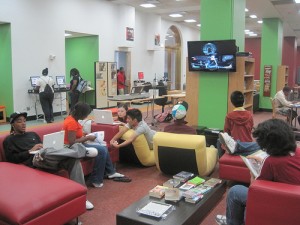Earlier this month, we covered the Fayetteville Free Library's new Fab Lab, the public library's plans to build a "makerspace" where library patrons could gain hands-on experience using 3D printers and other tools and could take programming and "shop" classes.
It's part of a larger movement to rethink and re-imagine what a public library will look like and what functions it will serve. While many people do see libraries solely as book repositories, it's clear that the library is much more than that. For many, it's an important community center and a place that offers access to digital tools and media.
A new competition sponsored by the Institute for Museum and Library Services (IMLS) and the John D. and Catherine T. MacArthur Foundation has just announced 12 winning libraries and museums that will receive $1.2 million in grant money help push the boundaries of what these institutions look like, specifically helping to create facilities that are better "learning labs" for teens.
The idea was inspired by YOUmedia, a teen learning space at the Chicago Public Library's downtown center. YOUmedia provides teens with access to thousands of books. But it also contains over 100 laptop and desktop computers -- machines that are equipped with various media creation software -- as well as an in-house recording studio with keyboards, turntables and a mixing board. YOUmedia also provides classes and connections to mentors so that teens can learn how to use the equipment.
Recognizing the importance of museums and libraries as sites for hands-on learning, the MacArthur Foundation and IMLS-sponsored competition plans to take the YOUmedia model and spread it nationally. The hope is for the new learning labs to serve as places where teens can explore science, technology, art, and literature -- not just to not just to read about it -- through building and making.


